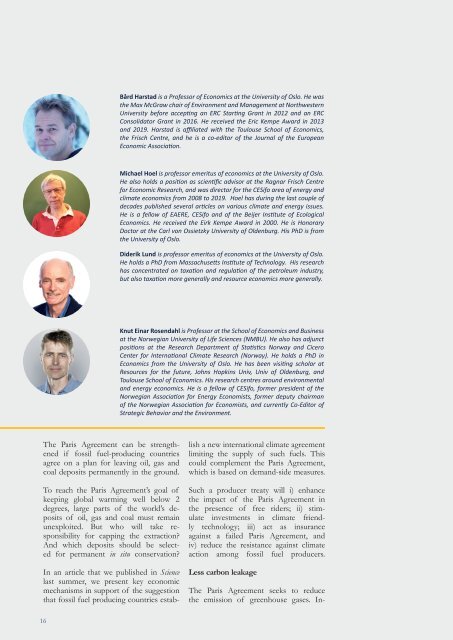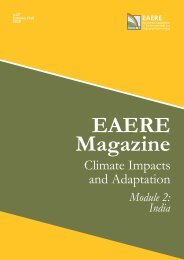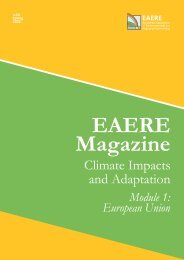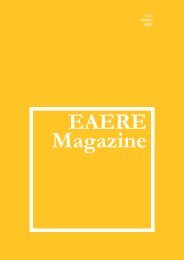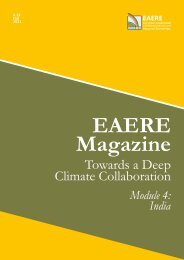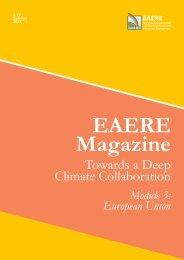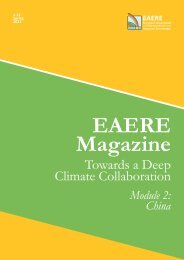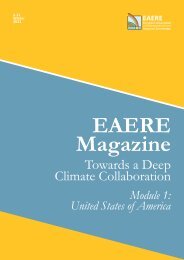Create successful ePaper yourself
Turn your PDF publications into a flip-book with our unique Google optimized e-Paper software.
Bård Harstad is a Professor of Economics at the University of Oslo. He was<br />
the Max McGraw chair of Environment and Management at Northwestern<br />
University before accepting an ERC Starting Grant in 2012 and an ERC<br />
Consolidator Grant in 2016. He received the Eric Kempe Award in 2013<br />
and 2019. Harstad is affiliated with the Toulouse School of Economics,<br />
the Frisch Centre, and he is a co-editor of the Journal of the European<br />
Economic Association.<br />
Michael Hoel is professor emeritus of economics at the University of Oslo.<br />
He also holds a position as scientific advisor at the Ragnar Frisch Centre<br />
for Economic Research, and was director for the CESifo area of energy and<br />
climate economics from 2008 to 2019. Hoel has during the last couple of<br />
decades published several articles on various climate and energy issues.<br />
He is a fellow of <strong>EAERE</strong>, CESifo and of the Beijer Institute of Ecological<br />
Economics. He received the Eirk Kempe Award in 2000. He is Honorary<br />
Doctor at the Carl von Ossietzky University of Oldenburg. His PhD is from<br />
the University of Oslo.<br />
Diderik Lund is professor emeritus of economics at the University of Oslo.<br />
He holds a PhD from Massachusetts Institute of Technology. His research<br />
has concentrated on taxation and regulation of the petroleum industry,<br />
but also taxation more generally and resource economics more generally.<br />
Knut Einar Rosendahl is Professor at the School of Economics and Business<br />
at the Norwegian University of Life Sciences (NMBU). He also has adjunct<br />
positions at the Research Department of Statistics Norway and Cicero<br />
Center for International Climate Research (Norway). He holds a PhD in<br />
Economics from the University of Oslo. He has been visiting scholar at<br />
Resources for the future, Johns Hopkins Univ, Univ of Oldenburg, and<br />
Toulouse School of Economics. His research centres around environmental<br />
and energy economics. He is a fellow of CESifo, former president of the<br />
Norwegian Association for Energy Economists, former deputy chairman<br />
of the Norwegian Association for Economists, and currently Co-Editor of<br />
Strategic Behavior and the Environment.<br />
The Paris Agreement can be strengthened<br />
if fossil fuel-producing countries<br />
agree on a plan for leaving oil, gas and<br />
coal deposits permanently in the ground.<br />
To reach the Paris Agreement’s goal of<br />
keeping global warming well below 2<br />
degrees, large parts of the world’s deposits<br />
of oil, gas and coal must remain<br />
unexploited. But who will take responsibility<br />
for capping the extraction?<br />
And which deposits should be selected<br />
for permanent in situ conservation?<br />
In an article that we published in Science<br />
last summer, we present key economic<br />
mechanisms in support of the suggestion<br />
that fossil fuel producing countries establish<br />
a new international climate agreement<br />
limiting the supply of such fuels. This<br />
could complement the Paris Agreement,<br />
which is based on demand-side measures.<br />
Such a producer treaty will i) enhance<br />
the impact of the Paris Agreement in<br />
the presence of free riders; ii) stimulate<br />
investments in climate friendly<br />
technology; iii) act as insurance<br />
against a failed Paris Agreement, and<br />
iv) reduce the resistance against climate<br />
action among fossil fuel producers.<br />
Less carbon leakage<br />
The Paris Agreement seeks to reduce<br />
the emission of greenhouse gases. In-<br />
16<br />
16


